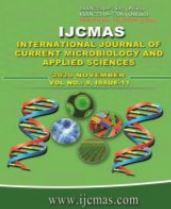


 National Academy of Agricultural Sciences (NAAS)
National Academy of Agricultural Sciences (NAAS)

|
PRINT ISSN : 2319-7692
Online ISSN : 2319-7706 Issues : 12 per year Publisher : Excellent Publishers Email : editorijcmas@gmail.com / submit@ijcmas.com Editor-in-chief: Dr.M.Prakash Index Copernicus ICV 2018: 95.39 NAAS RATING 2020: 5.38 |
Effect of municipal biodegradable waste on rice was studied during kharif seasons of 2018 and 2019 at Regional-Research Sub-Station (RRSS) Chakdaha of BCKV under New Alluvial Zone of West Bengal. The experiment was laid out in Randomized Complete Block Design (RCBD) with seven treatments viz., T1: Absolute control (No inorganic & No compost); T2: Recommended Dose of Fertilizer (RDF); T3: RDF + Krishi Rasayan (KR) Compost (Commercial compost) @ 3.75 t ha-1; T4: RDF + Ecovio (E.V.) Compost (source separated organic waste material) @ 3.75 t ha-1 ; T5: 50% RDF + KR Compost @ 3.75 t ha-1 ; T6: RDF + Krishi Rasayan Compost @ 3.75 t ha-1 + Mulch (Decomposible polythene Mulch); T7: RDF + Ecovio Compost @ 3.75 t ha-1 + Mulch (Decomposible polythene Mulch) replicate thrice. Experimental results revealed that all the growth and yield attributes were recorded maximum in the treatment receiving recommended doses of fertilizer along with chemical fertilizer integration with Ecovio Compost @ 3.75 t ha-1which ultimately reflect the maximum grain yield grain yield of 4.98t ha-1. Highest nutrient content (NPK) and uptake of grain and straw were also noticed in same treatment.
 |
 |
 |
 |
 |